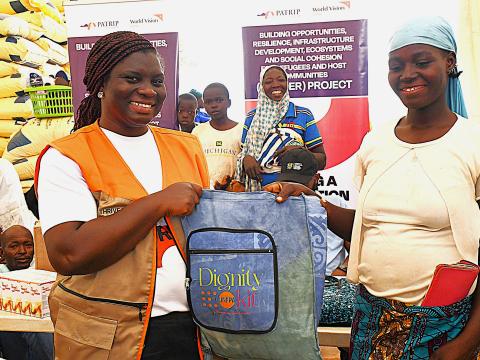Dignity Kits: A Gift that Restores Sense of Self-Esteem for Women and Girls in Zini and Tarikom Refugee Camps

Francis Npong, Communications Officer
As the relentless sun beams its rays on the rows of makeshift shelters that make up the Zini and Tarikom Refugee Camps, the inmates rise with uncertainty. For Aisha, 25, and Alima, 20-year-old women who fled to escape the merciless atrocities of insurgents in Burkina Faso, the challenges of each day are measured not just in meals and safety, but in the quiet, personal struggles that define their sense of self and dignity, roped in personal hygiene.
As usual, when it was announced for their meeting with World Vision Ghana and the United Nations Population Fund (UNFPA) – regular supporters of refugees in Ghana – one thing was sure: the distribution of relief items, of which food and clothing top it all. That has been the norm since Aisha and Alima arrived in Zini and Tarikom camps at separate times.
But this time, the items they received are not foodstuffs but a simple, sealed kit that offered them something they hadn’t used in months – dignity kits.
“For a woman, keeping hygiene is a dignity and therefore, to receive these items boost our dignity and comfort for the day,” Aisha said.
Aisha and Alima are among hundreds of women, girls, boys, men and elderly at the Zini and Tarikom Refugee Camps, located in the Upper West and Upper East regions, respectively, who received a specially designed ‘Dignity Kit’ from the United Nations Population Fund (UNFPA) in partnership with World Vision Ghana.
“The donation is more than a humanitarian gesture; it is a critical intervention aimed at protecting the health, safety, and psychological well-being of women and adolescent girls in a vulnerable setting,” said Samuel Gmalu, Humanitarian and Emergency Affairs manager at World Vision Ghana.
The kits, contained in sturdy, reusable bags, are a thoughtful assembly of essential items many take for granted: sanitary pads, bathing and laundry soap, toothpaste and toothbrushes, underwear, newborn essentials, and other hygiene products. For women like Aisha, who often prioritises children’s needs above her own, the kit is a lifeline.
“Before, during and after my monthly period, I would use and reuse rags. It was uncomfortable, unhygienic, and I lived in fear of staining my only good clothes or attracting infections,” said Aisha, who lives in the Zini camp. “Now, I have proper pads. I can go out and walk around without worry or being ashame during my monthly flow. I can feel like a normal girl again,” she added.
The distribution was accompanied by educational sessions on menstrual health and hygiene and gender-based violence – crucial information in crowded camp settings where risks can be heightened. World Vision Ghana and UNFPA staff moved through the camps, ensuring the kits were delivered directly into the hands of those who needed them most, fostering an environment of trust and care.
For Awurabena Dadzie, Health and Nutrition Technical Programme manager at World Vision Ghana, the profound impact of such basic items cannot be downplayed. “In the midst of a crisis, the specific needs of women, girls and babies can often be overlooked. These dignity kits are a fundamental tool for their protection and health. They allow women to manage their menstrual hygiene with safety and privacy, which is a basic human right. It’s about restoring a sense of normalcy and control during a time of great upheaval,” she said.
For Aisha, the kit’s contents represent a return to autonomy. As she carefully arranged the items and stacked them into a plastic bag, she explained what it truly meant to have access to those essential items.
“World Vision Ghana and UNFPA did not just give us items; they remembered that we are women and humans and gave us back our lost dignity,” a beneficiary said.